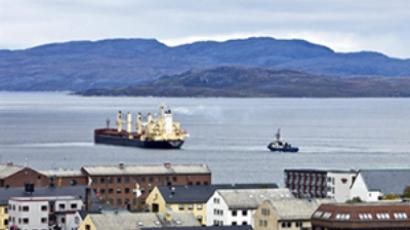Going North: Chinese PM in Iceland seeking influence in Arctic
China's premier Wen Jiabao has arrived in Iceland at the beginning of his European tour. While China says it is mainly interested in geothermal energy technology, many think the country is eager to lay its hands on the Arctic’s wealth of resources.
Wen will spend two days observing volcanic geysers and electricity plants where Iceland harnesses geothermal energy. Iceland is seeking cooperation with China in developing similar resources in east Africa.But Beijing does not deny its direct interest in the Arctic territories, which have large reserves of oil, gas, gold, diamonds, zinc and iron."China is willing to make contributions towards the peace, stability and sustainable development of the Arctic region, and it is on that basis that China seeks cooperation with Iceland," China’s vice foreign minister, Song Tao, said at a press conference on Wen’s trip to Europe.Officially the Arctic does not belong to any country, but there is an Arctic Council consisting of the eight member states bordering the territories: Russia, the United States, Canada, Norway, Sweden, Iceland, Finland and Denmark.China, which has the status of ad-hoc observer to the body, is seeking to become a permanent observer in order to acquire more power and may want to use Iceland’s poor economic situation to bolster Beijing’s position in the region.However, to gain permanent observer status China has to be approved by all the members of the council. Another item on the Chinese-Icelandic agenda is free trade. The two countries had already begun the talks on the issue, but they were suspended in 2009 as the island nation applied to join the European Union.Chinese and Icelandic officials said they will hold talks about resuming this process.After visiting Iceland, Wen will head for Germany, Poland and Sweden where he is to discuss investment and industrial projects.Wen’s trip shows the changing of geopolitical powers and Iceland is a very convenient place for China to start, says Arsaell Valfells, professor of economics and finance at the University of Iceland.“Icelandic-Chinese relations have been extremely friendly and we don`t have any points of friction between the two countries,” he explained.Nordic states pose little problem to China in its bid for permanent observer status and he thinks Russia and Canada would be much more difficult to persuade. Gang Chen, a researcher at the East Asian Institute, believes it is highly likely that China will get the status of permanent observer in the Arctic Council:“First, China will use all its diplomatic skills to get more support from Nordic countries, which are more friendly towards China,” Chen asserted. “Then it will also use its economic leverage to gain the support as the West is in the crisis now.” Political analyst Professor Joseph Cheng believes China is mainly interested in two things in the Arctic: possible new navigation routes and natural resources.Cheng added that China has something to offer to its prospective Arctic partners as the country has money, and resource exploration is always a risky business. Besides, he said, China is not seeking to be dominant in these ventures and is ready to be a junior partner.













